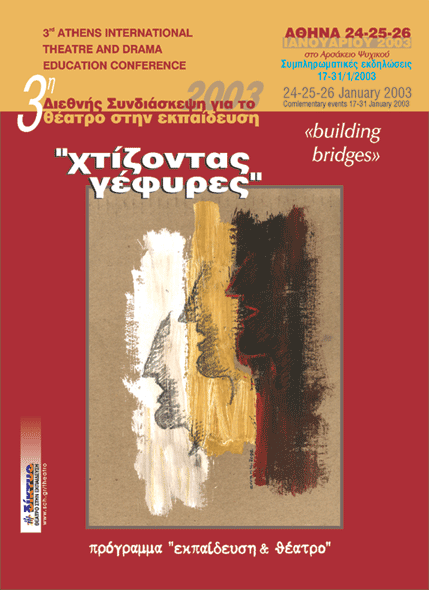 The Conference 2003 subject
The Conference 2003 subject
The 3rd International Theatre and Drama Education Conference took place in Athens on the 24th -25th -26th of January 2003, as part of the "Theatre and Education" project. It was an extended Conference that included keynotes, seminars, workshops and performances in central venues in Athens. The various events lasted for a period of 15 days. About 600 teachers, university students, academics and artists from 18 different countries participated.
The Conference title was "Building Bridges". It took place at a time when schools all over the world seem to be looking for a new identity. An identity which must have the potential to meet the challenges brought about by the deep economical, social, and political changes of the past few years. Globalization, and the "After September the 11th 2001 World" caused all sorts of new dilemmas for teachers at all school levels, as far as teaching methods and the content of education are concerned.
In the last few years more and more teachers have come to understand the potential of the performing arts mainly as teaching tools. Thus, the 3rd International Theatre and Drama Conference in Athens was an attempt to bring performing arts closer to school education and to highlight all their possible points of convergence.
The speakers and the seminar and workshop leaders showed how theatre/drama and the other performing arts are vivacious, dynamic forms that can express common human experience of any kind and in an international language. At the same time they can contribute to the removing of the barriers set up by isolation, to accepting and valuing the "other" as well as to raising the importance of common cultural features. They can successfully "build bridges" between different cultural, ethnic, racial, e.t.c. environments. They can also accommodate creatively the cultural capital of all young people in an attempt to involve sensitive social groups in current issues.
Performing arts efficiently intervene in cross-cultural teaching procedures and have evolved into genuine social interaction tools. Acceptance of the difference, xenophobia, violence, refugees, the Olympic Truce, human rights, civil rights, bio-ethical issues, addictions, social coherence, and physical and mental health were some of the issues addressed during the Conference.
All participants have had the chance to see how the global challenges and changes of the past few years influenced teaching methods in Greece and abroad. Several teaching models and applications in different stages of education from many countries were presented, as well as various art forms from the East and the West. Realistic theatre met Epic theatre, masks met ceremonies and music, social theatre met choreography, clowns met puppets and physical theatre, and fine arts met poetry and the cinema. The Conference managed to build bridges between them too.
Last but not least, another issue seems to have emerged from all the International Theatre and Drama Education Conferences. That of trying to bridge a part of the "formal" Greek education system, which is knowledge-centered and exam-oriented, with teaching models coming from the worlds of the Arts and of 'non-formal' education. Examples of this attempt were evident during this Conference too.